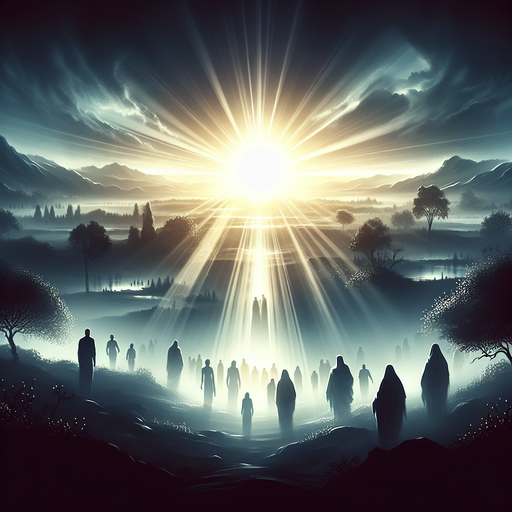In Isaiah 26:19, the promise of resurrection and hope shines brightly. This verse reminds us that faith in God brings the assurance of life beyond death. Join us as we explore the profound implications of this scripture for believers today at Study-bible.org. 
Understanding Isaiah 26:19: A Deep Dive into Its Meaning and Significance
Have you ever wondered what the Bible truly means when it speaks about resurrection and hope? One verse that beautifully encapsulates these themes is Isaiah 26:19. In this article, we will explore the rich meanings behind this powerful scripture, unravel its implications for our lives today, and answer some common questions that arise around this verse.
What Does Isaiah 26:19 Say?
The verse reads as follows in the New International Version (NIV): *”But your dead will live, Lord; their bodies will rise—let those who dwell in the dust wake up and shout for joy. Your dew is like the dew of the morning; the earth will give birth to her dead.”* This passage paints a vivid picture of **resurrection** and **renewal**. It brings forth a message of hope for those who have passed away and assures the living that death is not the end. As we delve deeper, you’ll discover why Isaiah 26:19 remains a source of comfort for countless believers.
The Context of Isaiah 26:19
To fully grasp the significance of Isaiah 26:19, it’s essential to understand the context of the Book of Isaiah. Written by the prophet Isaiah during a time of great turmoil, his prophecies often provided messages of both judgment and hope. This particular chapter, however, focuses on the hope of restoration and the assurance of life after death. Isaiah 26 is part of a song that celebrates God’s faithfulness and the promise of future triumph over adversity. The verse reflects a profound belief in the resurrection, which is a foundational concept in Christian teaching.
The Key Themes of Isaiah 26:19
When examining Isaiah 26:19, several key themes stand out:
1. Resurrection
The most prominent theme in this verse is resurrection. The imagery of the dead rising and waking up signifies that life continues beyond physical death. The phrase “let those who dwell in the dust wake up” reinforces the idea that even those who seem lost will be restored.
2. Joy and Celebration
Isaiah invites the dead to “shout for joy,” emphasizing the joy that accompanies resurrection. This suggests that the transition from death to life is not just an event but a cause for great celebration.
3. The Earth’s Fertility
Comparing God’s dew to the dew of the morning implies freshness and new life. Just as dew nourishes the earth, the earth will also give birth to the resurrected. This connection highlights a cyclical understanding of life, death, and rebirth.
Theological Implications of Isaiah 26:19
The verse has significant theological implications. For many Christians, Isaiah 26:19 foreshadows the resurrection of Christ. This connection is crucial as it bridges the Old Testament with New Testament teachings. The triumph over death encapsulated in this verse serves as a precursor to the hope found in the resurrection of Jesus. Additionally, Isaiah 26:19 reassures believers of their own resurrection, affirming that they will be reunited with loved ones who have passed away. This promise provides comfort and hope amid grief and loss.
Modern-Day Reflections on Isaiah 26:19
As we reflect upon Isaiah 26:19 in our current context, it invites us to embrace hope during challenging times. Many individuals today grapple with feelings of despair, loneliness, or grief. This verse serves as a gentle reminder that renewal and resurrection are possible—not only in the physical sense but also in our spiritual lives. Imagine facing hardships with the knowledge that life can emerge from what feels like an ending. Just as the earth gives birth to the dead, we too can rise from our struggles and find new beginnings.
Frequently Asked Questions about Isaiah 26:19
What does “the dead will live” mean in Isaiah 26:19?
This phrase refers to the belief in resurrection. It signifies that those who have died will come back to life, opening the door to eternal existence with God.
How can Isaiah 26:19 provide comfort to someone grieving?
The verse reassures believers that death is not the end. It offers hope of reuniting with loved ones and emphasizes the joy that comes with resurrection.
Is Isaiah 26:19 relevant to Christians today?
Absolutely! Isaiah 26:19 holds profound significance for Christians, serving as a cornerstone of belief in life after death and the resurrection of Christ.
Conclusion
In conclusion, Isaiah 26:19 is a beacon of hope, illustrating the promise of resurrection and the joy that accompanies it. Through this verse, we learn that even in the face of death, there is the hope of renewal and life. As you reflect on Isaiah 26:19, may your heart be filled with peace and assurance, knowing that life triumphs over death, and every ending is but a new beginning.
Questions and answers on “Awakening Hope: The Promise of Isaiah 26:19 and the Resurrection of the Righteous”
“`html
What does Isaiah 26:19 say?
Isaiah 26:19 states, “Your dead shall live; together with my dead body they shall arise.” This verse emphasizes the hope of resurrection and eternal life, reflecting a central theme in many religious beliefs.
2. How is Isaiah 26:19 interpreted in Christianity?
In Christianity, this verse is often seen as a prophetic message about the resurrection of the dead, pointing to the belief in Jesus Christ’s resurrection as a promise of eternal life for believers.
3. What is the significance of Isaiah 26:19 in Jewish thought?
In Jewish interpretation, Isaiah 26:19 highlights the concept of bodily resurrection and the renewal of life, showing that faith in God’s promise transcends death and reinforces hope in the future restoration of Israel.
“`
la_palabradedios11
#Espiritu #Jesúcristo #LagloriadeDios
Further thoughts on Isaiah 26:19
# Key Concepts in Christian Theology: A Focus on Isaiah 26:19-21 Christian theology is rich with profound teachings and insights that have shaped the beliefs and practices of millions. One particularly poignant passage is found in **Isaiah 26:19**, which speaks to themes of resurrection, hope, and divine protection. This article will delve into the meaning, commentary, and various translations of **Isaiah 26:19**, exploring how these ideas resonate within modern religious teachings and the lives of believers today. ## Understanding Isaiah 26:19-21 **Isaiah 26:19** (KJV) states: > “Thy dead men shall live, together with my dead body shall they arise. Awake and sing, ye that dwell in dust: for thy dew is as the dew of herbs, and the earth shall cast out the dead.” ### Meaning of Isaiah 26:19 The verse presents a promise of resurrection and spiritual renewal. The imagery of the dead rising suggests a future hope that transcends earthly existence. In modern Christian teaching, this resonates strongly with the belief in life after death and the resurrection of Jesus Christ, which forms the cornerstone of faith for many Christians. ### Commentary on Isaiah 26:19 Commentators often emphasize the duality present in this passage. The **Isaiah 26:19 commentary** reveals that the call to “awake and sing” symbolizes the joy of redemption and salvation. This act of awakening from the dead serves as a metaphor for spiritual revival, reflecting God’s promise of restoration. This theme of resurrection continues into verses **Isaiah 26:20** and **Isaiah 26:21**, where the prophet encourages believers to seek refuge in God during times of trial, reinforcing the idea that divine protection is ever-present for His people. ### Translation Perspectives: KJV, NIV, ESV, NLT Different Bible translations provide varied nuances to the same verse: – **Isaiah 26:19 KJV** offers the traditional language that has resonated through centuries. – The **Isaiah 26:19 NIV** reads: > “But your dead will live; their bodies will rise—let those who dwell in the dust wake up and shout for joy.” – The **Isaiah 26:19 ESV** similarly affirms the resurrection theme with straightforward prose. – The **Isaiah 26:19 NLT** offers a more contemporary interpretation, appealing to modern audiences: > “But those who die in the Lord will live; their bodies will rise again!” Each version serves to bring the message of hope and resurrection to a diverse audience, emphasizing its relevance across generations and cultures. ### Resources: Bible Hub Interlinear For those interested in deeper theological study, resources such as **Isaiah 26:19 Bible Hub interlinear** provide a word-for-word translation that can elucidate the original Hebrew text, enhancing one’s understanding of the nuances embedded in this verse. ## Modern Religious Teachings and Their Impact The concepts reflected in **Isaiah 26:19** underpin essential teachings in modern Christianity. The promise of resurrection instills hope in believers, fostering a sense of purpose and perseverance amid life’s challenges. ### Manifestations in Daily Life Believers often incorporate the message of resurrection and divine protection into their daily lives: – **Worship Practices:** Many congregations celebrate Resurrection Sunday (Easter), reflecting on the resurrection of Jesus and its implications for eternal life. – **Funeral Services:** Scripture from **Isaiah 26:19** is frequently read at memorials, offering comfort to grieving families with the assurance of a reunion in the afterlife. – **Daily Encouragement:** Believers may use this verse as a personal mantra, reminding themselves that their struggles are temporary and that God promises ultimate redemption. ### Conclusion The profound themes encapsulated in **Isaiah 26:19** extend far beyond ancient texts; they resonate deeply within the hearts of believers today. Through various translations and interpretations, this verse continues to inspire hope, encourage spiritual awakening, and remind the faithful of God’s protective embrace. As we engage with these sacred teachings, they shape our understanding of life, death, and the promise of what lies beyond, allowing us to navigate our journeys with faith and assurance.
